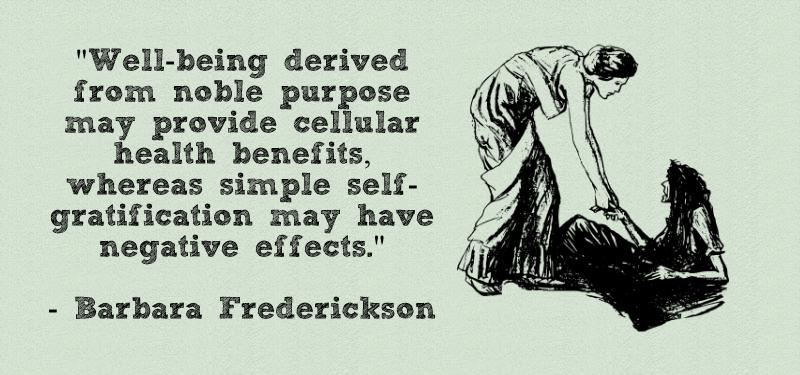Is there a missing moral component at the root of happiness? The ancient Greeks definitely thought so, and it turns out that genomic research conducted by Barbara Frederickson, which Winton Bates writes about at his excellent blog Freedom and Flourishing, indicates that we may be biologically wired for what they called eudaimonia (from daimon, or true nature). Differing from hedonism (pleasure or self gratification), eudaimonia is often translated as flourishing or living well, with a sense of noble purpose, virtue, and connection to others.
In other words, real happiness is impossible without virtue - or arete in ancient Greek. Arete means excellent character, or reaching your highest human potential. Eudaimonia not only protects our physical and mental health at the cellular level, it may lead to a long term, more profound sense of well being.
So what do we do if we want to experience eudaimonia? How do we reach our highest potential?
There are 3 concrete steps that you can take to be happy in the ancient Greek sense. First, you must acknowledge that virtue is necessary for happiness. Eudaimonia is about more than just feeling good, it is about becoming the best person that you can be. Second, you must do the inner work that is necessary to truly "know yourself," as Socrates said when he quoted the Delphic Oracle. And finally, you must take action and apply your unique talents and gifts in life for the good of yourself and others.
1. Understand That Virtue Is Necessary For Happiness
Various Eastern and New Age philosophies offer a different definition of happiness, one that is interesting and perhaps more complete - that happiness is the byproduct of our life's journey, and not a destination to be arrived at or something to be gained. But rather a state of mind or a sense of flow. This definition is closer to eudaimonia, but still morally agnostic.
It was the ancient Greeks who offered the most compelling definition of happiness, one that includes an ethical dimension - eudaimonia. Aristotle was the first philosopher to really flush out the concept of eudaimonia, but Plato's writings, as well as Socrates', contained elements of it. Aristotle felt that happiness in the modern, hedonic sense was a vulgar concept. Not all pleasures lead to well-being. In the Nichomachean Ethics, Aristotle notes that "Living well and doing good are the same as being happy."
The Stoics went even further than Aristotle and argued that only virtue is necessary for happiness. Aristotle thought that some elements of hedonic happiness, such as having good food, a home, family, leisure, and so on, were necessary for a good life. But a good life was incomplete without also pursuing excellence. We don't live well only by amusing ourselves.
The ancient moral dimensions of happiness through virtue and excellent character were lost sometime in the interceding millennia. But Barbara Frederickson's recent genetic study seems to support Aristotle's position, or maybe the Pythagorean position. While hedonia is somewhat necessary, it is eudaimonia which benefits us the most:
“We can make ourselves happy through simple pleasures, but those ‘empty calories’ don’t help us broaden our awareness or build our capacity in ways that benefit us physically,” she said. “At the cellular level, our bodies appear to respond better to a different kind of well-being, one based on a sense of connectedness and purpose. Understanding the cascade to gene expression will help inform further work in these areas,” Frederickson states.
2. Know Yourself
Plato believed that the human psyche has 3 parts: logical (or intellectual), spirited (having to do with action and the courage to be good) and appetitive (having to do with desires and emotion). In the just person, all three parts of soul agree that the logical must rule, bringing the other 2 parts - the spirit and the emotions - into a state of good or concordance.
The point here is that if you want to be happy, you can't be internally at war with yourself. You must bring your intellect, emotions, and actions into harmony with each other. Otherwise, you might experience a situation where you desire something that you know to be wrong intellectually - and the result is often bad decisions and unhappiness.
The psychologist Carl Jung believed that accepting and Integrating the shadow into your conscious personality is a great way to flush out any internal contradictions withing your psyche. The result of shadow work is the full integration of the self, leading to a better understanding of your true nature, or daimon in Greek.
If you don't know how to begin doing shadow work, my Knowing Yourself Better Questionnaire is a good place to start. I can say that this technique has helped me personally.
3. Find Your Life's Purspose
We all have free will to make choices that improve our well being. This tendency towards growth and flourishing is common to both the Greek philosophical tradition and modern humanistic psychology. The psychologist Carl Rogers states:
‘...man's tendency to actualize himself, to become potentialities. By this I mean the directional trend which is evident in all organic and human life - the urge to expand, develop, mature - the tendency to express and activate all the capacities of the organism and the self. This tendency may become deeply buried under layer after layer of encrusted psychological defences; it may be hidden behind elaborate facades that deny its existence; it is my belief, however, based on my experience, that it exists in every individual, and awaits only the proper conditions to be released and expressed'.
A good, happy life, is the result of a virtuous character, self acceptance, and continual striving towards excellence.
You May Also Like:
4 Life Lessons We Can Learn From The Cynics
The Shadow: How Introspection Can Teach You Everything You Need to Know About Yourself










